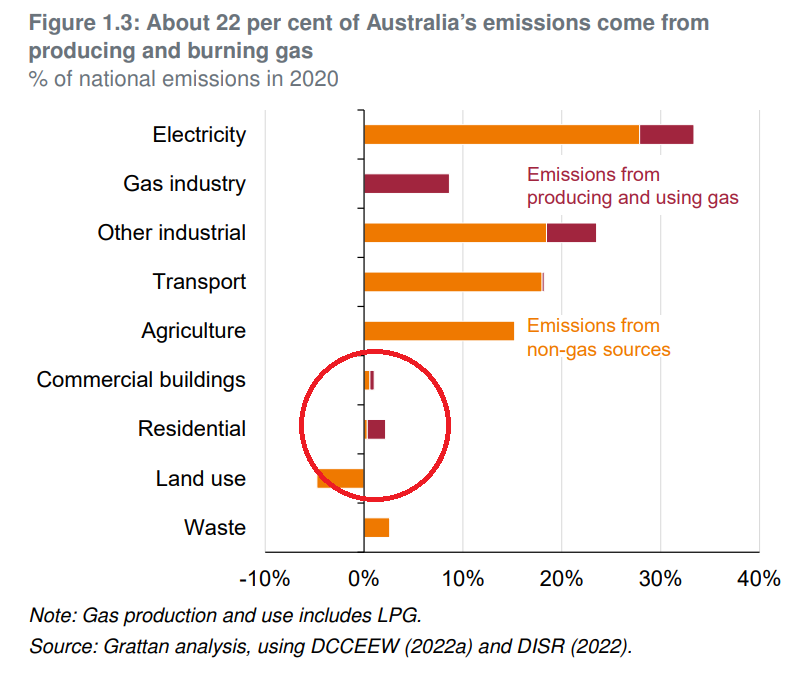This is so dumb that I don’t know where to look. The Guardian is triumphant as it sells the Grattan Institute’s household decarbonisation garbage:
Victoria’s policy to ban gas connections for new residences from next year would cut the state’s greenhouse gas emissions by almost a sixth compared to typical new dual electric and gas-run homes, analysis by the state government has found.
The government’s ban on new homes connecting to gas, announced in July, drew some criticism from those who argued emissions would actually rise in the short-term because the state’s electricity sector had a higher emissions intensity than gas.
However, analysis provided to Guardian Australia by the Department of Energy, Environment and Climate Action found a new, all-electric home would have 16% lower emissions than a new dual gas-electric home, saving 900kg of carbon-dioxide equivalent (CO2-e) a year.
Peter Hannam knows better. But then, working at The Guardian comes with a compulsory fake left lobotomy.
Here is what this policy will achieve:

Moreover, because the east coast is in a permanent gas crisis, going electric will boost carbon emissions as states fall back on publically subsidised coal-fired power.
How did it come to this? Ask the Grattan Institute’s Tony Wood:
Grattan Institute’s Tony Wood said getting all households off gas was critical to meeting government emissions reduction targets.
“In Victoria it’s the most important bit cause we use gas for heating our homes and therefore, gas use at home is a much bigger volume in the Victorian home, than the amount of gas used in Brisbane, for example, where you might only use gas for cooking,” Mr Wood said.
“Other states will in time have to move down the same path, even though their priorities might be somewhat different in the short-term.”
“Critical”. If only he were joking. Politicians have swallowed this garbage because it makes them look like they are doing something.
They are costing households tens of thousands of dollars to rip out gas while monstrous gas emitters like the gas cartel are left alone. Does Grattan even include fugitive emissions in their output?
But, why would we expect anything else from Grattan? It is sponsored by two east coast gas cartel founding members, BHP and Origin. Tony Wood is a former executive at Origin.
When the question of how to decarbonise Australian stationary energy was confronted in 2013, gas was critical to phase out coal and transition energy cheaply and efficiently, but Wood argued instead to let the gas cartel ship it all to China:
“With more than $160 billion forecast to be invested in LNG production, the export industry is good for the economy. Governments should therefore resist self-interested calls from some industries to reserve gas or cap prices for the domestic market”.
“One reason that reserving gas is a bad idea is that there is no shortage of gas. The challenge is to ensure that the gas gets delivered to where it is required, and this means commercial buyers and sellers need to reach commercial terms on new arrangements”.
“Capping prices for the domestic gas market is a very bad idea. It amounts to a tax on producers and a subsidy for domestic gas users. Protectionism of this sort may provide some short-term price relief for targeted industries, but it tends to mean inefficient businesses and less investment”.
“Ultimately it leads to higher prices and damages the economy for us all”.
The rest is history. Our energy transition has been hobbled ever since, costing hundreds of billions and multiple governments power. There is no greater policy blunder in the modern history of Australia.
And the crisis is still going:
Worries about gas shortages on the east coast could resurface this week as producers publish forecasts for the volume of uncommitted gas they have available over the next two years, with expectations they will expose a potential scarcity of supply.
Shell, Santos and other large east coast suppliers must – under the Albanese government’s new code of conduct for gas producers in the eastern states – provide information on available gas in a requirement intended to increase transparency in the troubled market.
While the raw data is expected to take time for the market to digest, gas industry sources suggest that the figures may cause renewed uneasiness as it becomes clearer how vulnerable the market is to a shortfall, especially as a looming decline in production from the Bass Strait takes hold and LNG import projects are delayed.
While Grattan’s mates at Origin cream it:
Fund manager Perpetual wants Origin Energy’s board and management to push suitors Brookfield and EIG Partners for a better deal than their agreed $18.7 billion price, recognising the target’s rapidly improved profitability and a growing consensus that Origin’s Eraring coal-fired power station will outlive its 2025 retirement date.
As you rip gas out of your walls for $20k, you will be accessing power from Origin’s Eraring carbon-spewing monster in NSW or Low Yang-A in VIC, because Origin and its cartel mates have already sent all of your gas to China.
Bravo Origin-sponsored Grattan Insitute.

